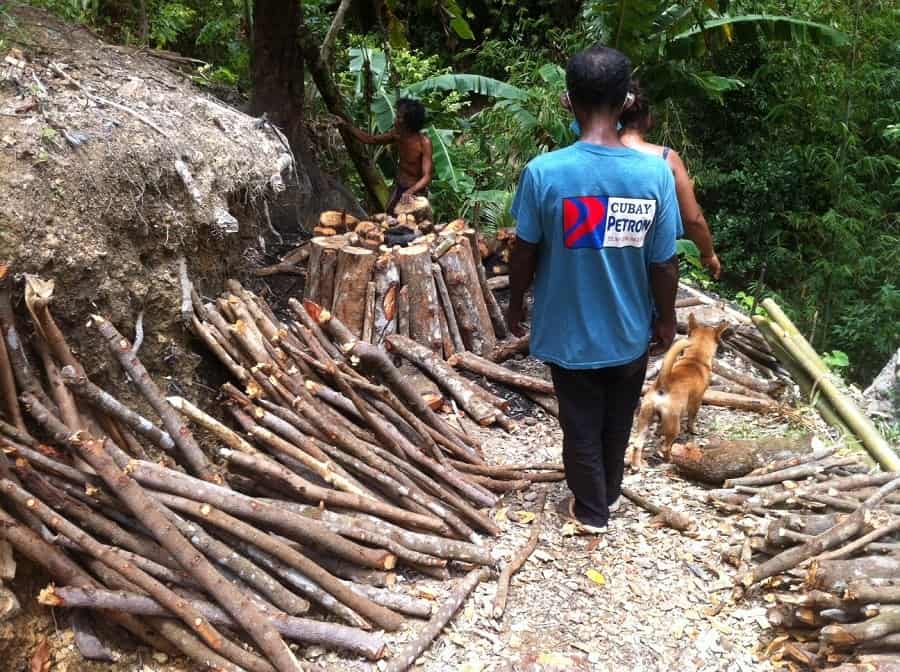Last Updated on June 8, 2023 by Ellen
How many tree seedlings fit in a 16-foot box truck? Answer: 422.
I know because I just stuffed full a rental truck here in the Philippines — part of yet another of our ongoing projects with the disadvantaged indigenous Ati tribe.
Yes, as my wife has reported, we are under another quarantine/lockdown. And yes, for the past two months, travel could only be done with an officially issued ‘travel pass’.
But fearing even more restrictions come August, I decided to get such a pass (for ‘humanitarian’ reasons) at the end of July and make the 125-mile round trip to the Aklan State University agricultural center where innumerable baby fruit trees are available at cut rate cost.


The trees – and tree planting – have been on my mind all year. During that time, I’ve been saddened to witness the cutting and burning of many of the mature trees on the Ati tribal lands here in Malay, Aklan, on Panay island – where we have been helping the Ati with various sustainability and improvement projects. (New bridge; henhouse; running water; electric service.)
Unfortunately, making and selling charcoal (pictured below) is one of the few means the Ati have had to generate income during the coronavirus crisis. A charcoal burn can net $200 to $300. Big money here.
Making charcoal means felling trees. Lots of trees. The chopped wood is then fired under an earth mound and smolders for days. It’s an age old process that takes some skill.



Of course, I hate seeing the forests burned and the sky polluted. But I understand the Ati’s dire financial condition. And I have to respect their decisions regarding their own land.
Still, I can do something about the situation.
My solution: launch a replanting program – with a few twists.
First, the replacement/replanted trees will be native fruit trees: mostly small, fast growing varieties, some more like bushes — far less appealing as wood for future cutting.
Second, we will involve the Ati community themselves in the replanting and care of the trees – especially the women and children.
Third, we will provide a much needed economic reward to the
Ati for getting the hundreds of small trees into the ground in a proper and efficient manner.
Most of the trees were inexpensive true ‘seedlings’ – grown from seed. But some were more costly ‘grafted’ or ‘marcotted’ trees which will produce reliable fruits much quicker. Others were larger 3 to 4 year-old trees.
Here’s the list of trees with English translation/description as needed:
- 50 – Atis (sugar apple / sweet-sop)
- 10 – Pomelo (huge grapefruit)
- 40 – Guyabano
- 10 – Avocado
- 65 – Makopa (rose apple)
- 15 – Dalandan (orange)
- 10 – Tambis (water rose apple)
- 7 – Langka (jackfruit)
- 56 – Lanzones (longkong)
- 7 – Kastanias (chestnut)
- 65 – Marang (johey oak)
- 7 – Mango
- 33 – Cacao
- 7 – Lemon
- 15 – Santol (cotton fruit) 25 – Hybrid Coconut
The total paid for all 422 fruit trees: 25,050 Philippine pesos / $503. Broken down, that equals about $1.19 per tree.
The round-trip truck rental (including gasoline, driver, and helper) was 6,000 pesos / $120.
As for the half-day trip to the University agricultural center. No problem.
The truck was safe and comfortable, weather good, the guys friendly and helpful (despite very little English), the trip smooth and uneventful even though we were prepared for COVID lockdown delays. Thankfully, we did take a secondary road ‘detour’ to avoid one major bottleneck.
In the end, no one ever asked to see our travel passes. And naturally, we abided by all mandated coronavirus protocols throughout the day.


Now we will devise an incentive scheme to get all the trees safely transported up to two different Ati hilltop settlements where lots of trees have been chopped down.
Of course, ‘reforesting’ is the primary goal – but creatively getting funds into the hands of very needy Ati families is similarly important at this economically uncertain time. Details to follow.
At present, all the fruit trees have been collected at the trail heads for their journey up to the ‘planting grounds’. I’ve paid a few more dollars to some caretakers to keep them watered and protected until we do the planting later this week.


As always, be thankful and generous, (special thanks to our overseas donors and supporters), happy trails & more beer.
Life is NOW!


What a great project, Tedly! This will benefit so many people for many years. You are Blessings and beer!
Hi, enjoyed coming to your page for Mazatlan, then saw the PH posts and wanted to look haha, this is second one. I think I will marry a Pinay fairly soon, but we gave up on me going to her in Cainta/Antipolo with the covid craze. With her it seems quite different than other filipinos I speak with daily the last 7 years. Over the last 18 months, I went from hopeful to make a difference (an idea she and I would live in PH. It was actually her who got in touch with a buried desire to not live in PH that was years old….), to feeling I do not see how to have deeply meaningful exchange with the filipinos I relate to here or the various daily chats. Without writing like its a paper for a cross cultural relations class, I will just say under the positivity layer is their outlook which is deeply skeptical of almost anyone/everything, and often incapable of considering/seeking creative solutions, alternatives. Your post is interesting, glad I saw. I am not so certain these people own what they are doing so much but may very well be. Regardless, happy to see this. Kind regards, Ron
Fabulous! And…the #422 has a special place in my heart ♥️